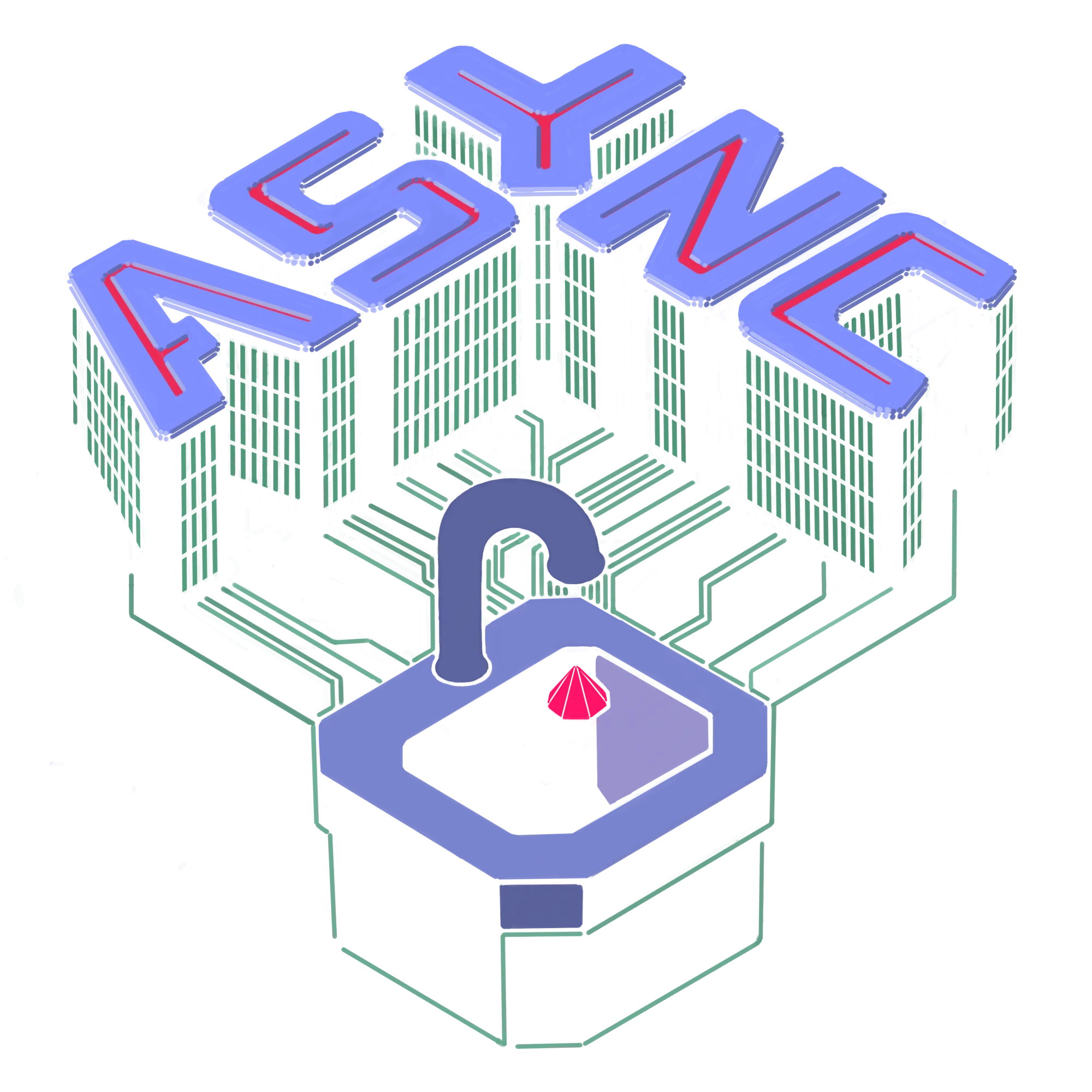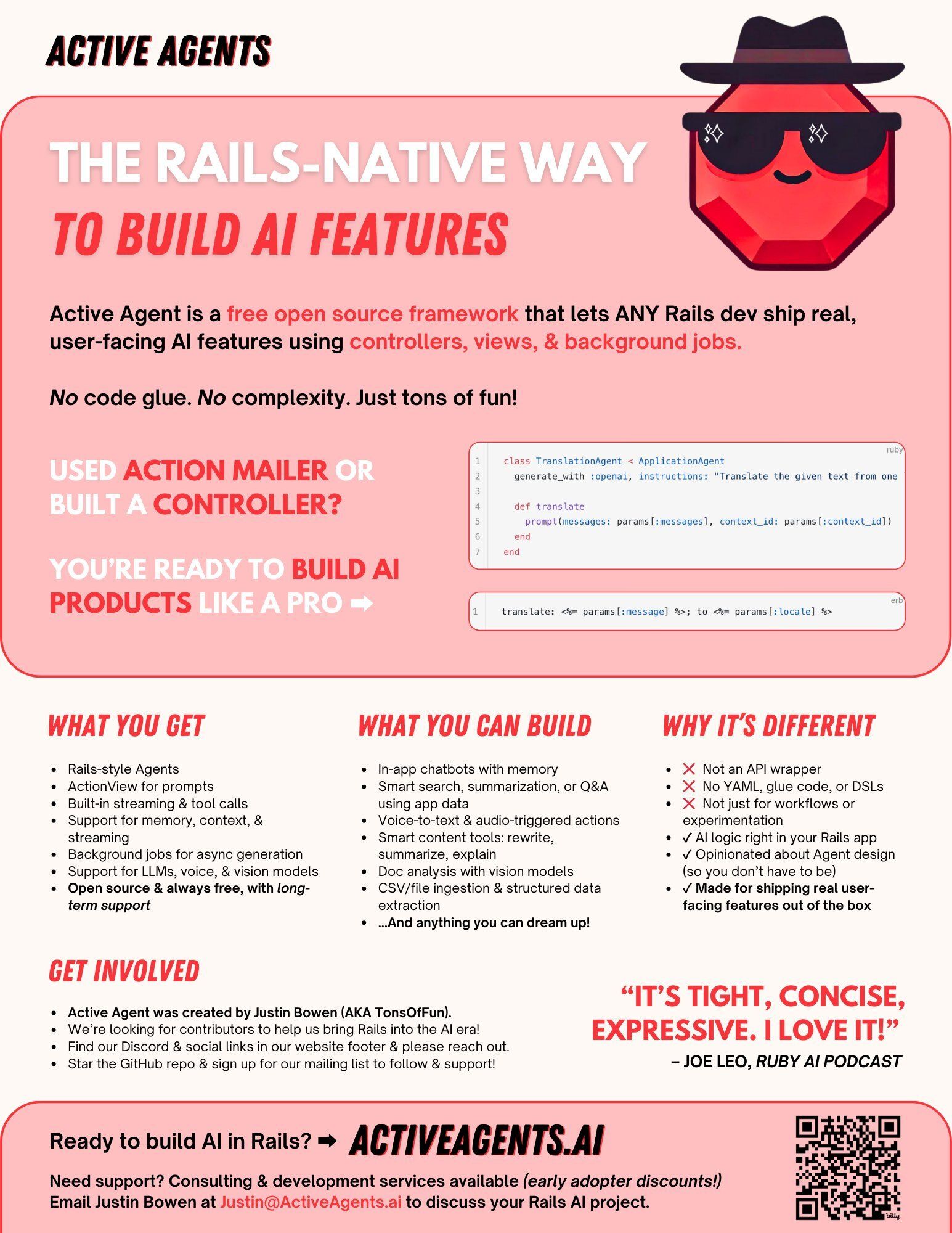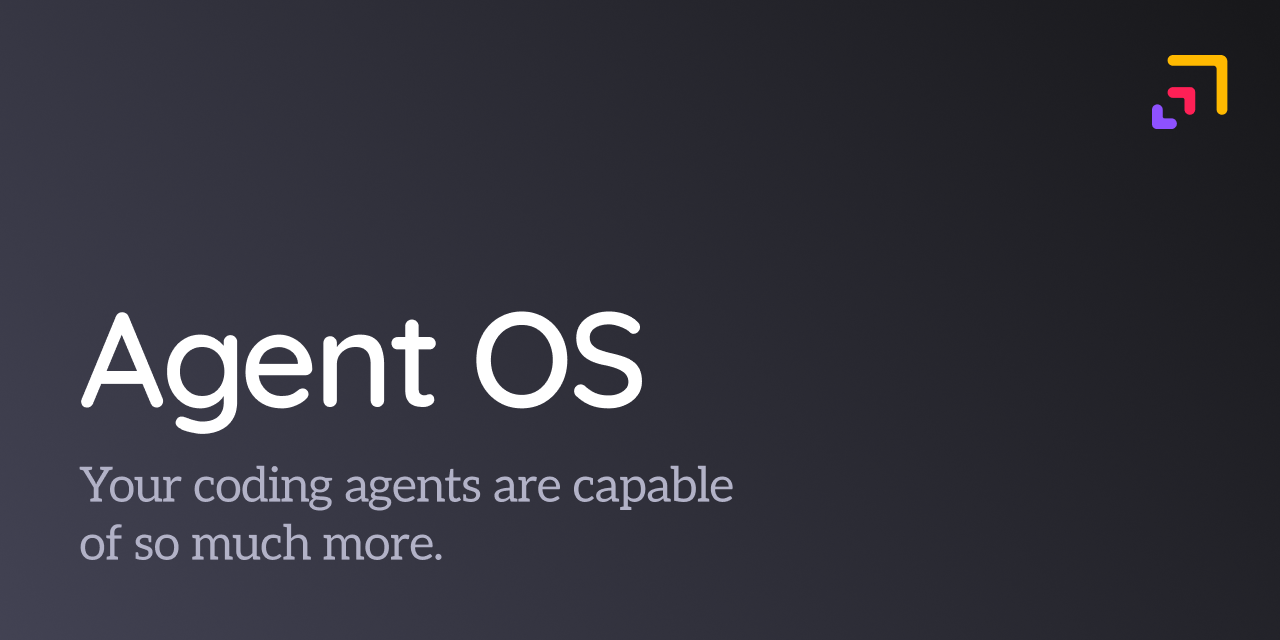- RoboRuby
- Posts
- Ruby AI News - July 22, 2025
Ruby AI News - July 22, 2025
Claude Code has arrived
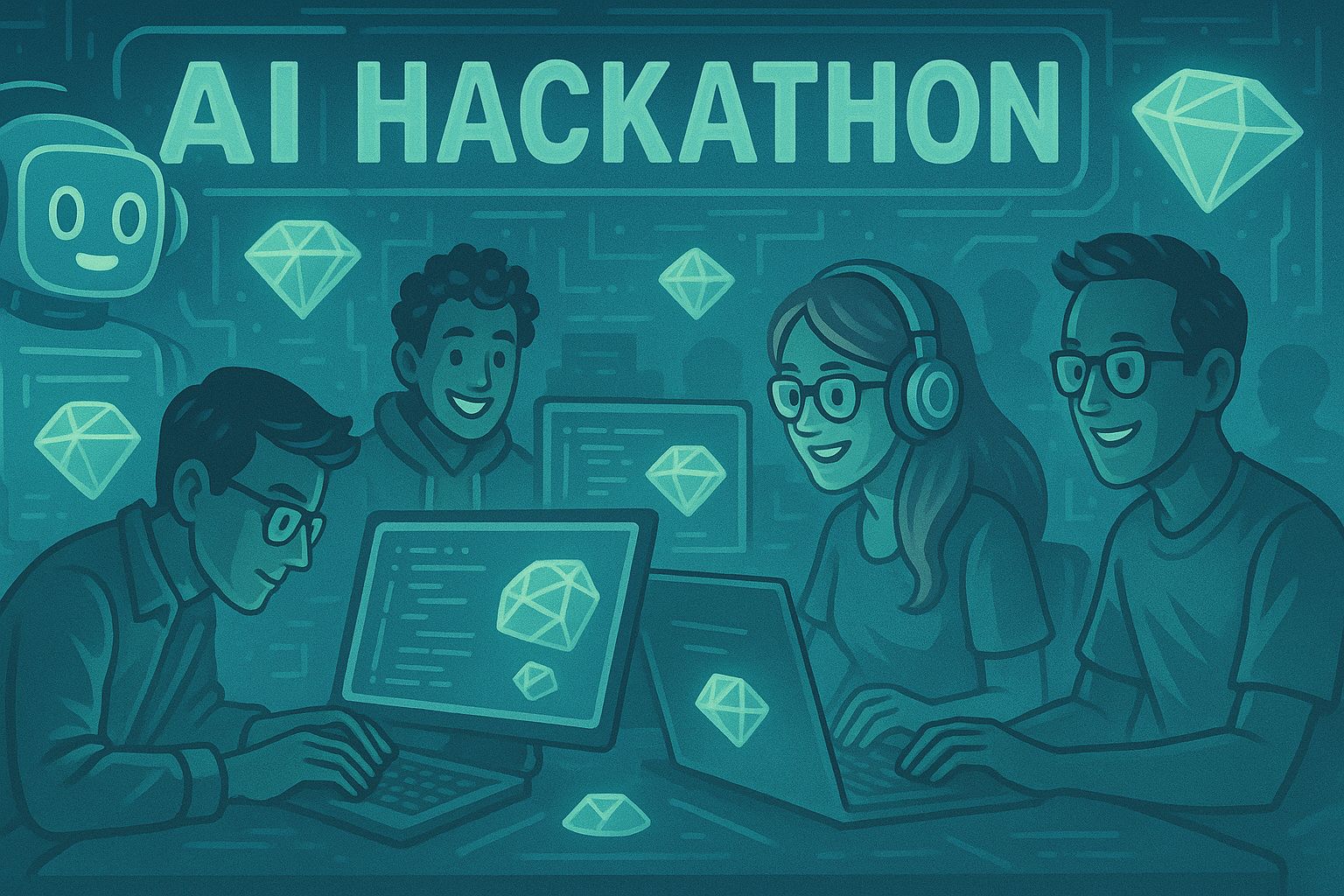
Pro tip: Due to the size of the newsletter, many email clients truncate the content. It is recommended to read on the web for the best experience.
Welcome to the 11th edition of Ruby AI News! This edition features a look at Ruby’s asynchronous future, the arrival of Claude Code as the new software engineering meta, an overview of the first ever Ruby AI Hackathon, and much more.
Newsletter Update: In case you missed it, last week I published a Mega Ruby AI Jobs & Opportunities Report with over 250 roles at the intersection of Ruby and Artificial Intelligence available now. Also, Joe Masilotti just launched RubyFriends, a social network for Rubyists to reconnect and keep the conversation going after meeting. Be sure to add me and all of your Ruby friends!
Contents
Top Stories
Ruby AI’s Asynchronous Future
Carmine Paolino exemplified one of the best value propositions for building generative AI applications with Ruby in Async Ruby is the Future of AI Apps. Carmine highlights how Ruby’s asynchronous capabilities leveraging fibers, actors, and event-driven libraries enables scalable, nonblocking concurrency for AI-based web services and background jobs. He further elaborates:
Every Rails AI app hits the same wall: Sidekiq/GoodJob/SolidQueue have max_threads settings. 25 threads = 25 concurrent LLM chats max. Your 26th user waits because all threads are camping on 60-second streaming responses.
Here's what shocked me after more than a decade in Python: Ruby's async doesn't require rewriting anything. No async/await infection. Your Rails code stays exactly the same.
I switched to async-job. Took 30 minutes. No max_threads = tons more concurrent chats on the same hardware and no slot limits. Libraries like RubyLLM get async performance for free because Net::HTTP yields to other fibers at I/O operations.
The key insight: thread pools make sense for quick jobs, not minute-long LLM streams that are 99% waiting for tokens.
Ruby quietly built the best async implementation. No new syntax, just better performance when you need it.
The community seems to strongly agree in these testimonials:
I strongly encourage you to read the full article and try it out for yourself.
Claude Code Has Arrived
One of the key takeaways from RailsConf was that LLM-driven agentic coding workflows aren’t coming - they’re here now. Claude Code was released on February 24th, 2025, and since that time, Kieran Klaassen, the General Manager of Cora, has been on mission to maximize its potential and create the future of AI-assisted software engineering.
Must Watch: Kieran sat down with Peter Yang of the Creator Economy for a Full Tutorial on Building an App with Multiple AI Agents using Claude Code. The video covers a wide range of topics including subagents, Git worktree scripts, slash commands, prompt templates, and Github integration. It also includes a cool demo of Kieran’s new email client Cora, built with Rails and RubyLLM.
Kieran consistently shares his coding workflows and Claude Code insights. For instance, he recently published How I Use Claude Code to Ship Like a Team of Five, sharing an example of a day in the life of an agentic coder. The article and accompanying videos look at fixing bug reports, linting, automating documentation, and submitting pull requests, all via the terminal and Claude Code.
How does he have such a deep understanding of Claude Code? One way is that Kieran has used Claude Code to analyze Claude Code. His findings are fascinating, and he comes to the conclusion that Claude Code is not just an AI, it is a distributed cognitive architecture pretending to be a coding assistant. You can read the full report in Claude Code Capabilities Report: A Deep Dive into My Inner Workings. He also shared his insights as part of a Claude Code Camp, available to Cora subscribers.
But wait, there’s even more alpha! Every, the organization behind Cora, published a repository of Claude Code commands, a set of prompt templates for common software development tasks.
If you’re ready to get started with Claude Code, here are some of my favorite resources:
Claude Code Documentation: Official Anthropic Claude Code docs
Awesome Claude Code: A curated list of commands, files, and workflows
Claude-on-Rails: A development framework for Rails inspired by SuperClaude
How I Use Claude Code: A collection of best tips and practices
Claude Squad: Manage multiple AI agents in git workspaces (h/t Valentino Stoll)
Ruby AI Hackathon Recap
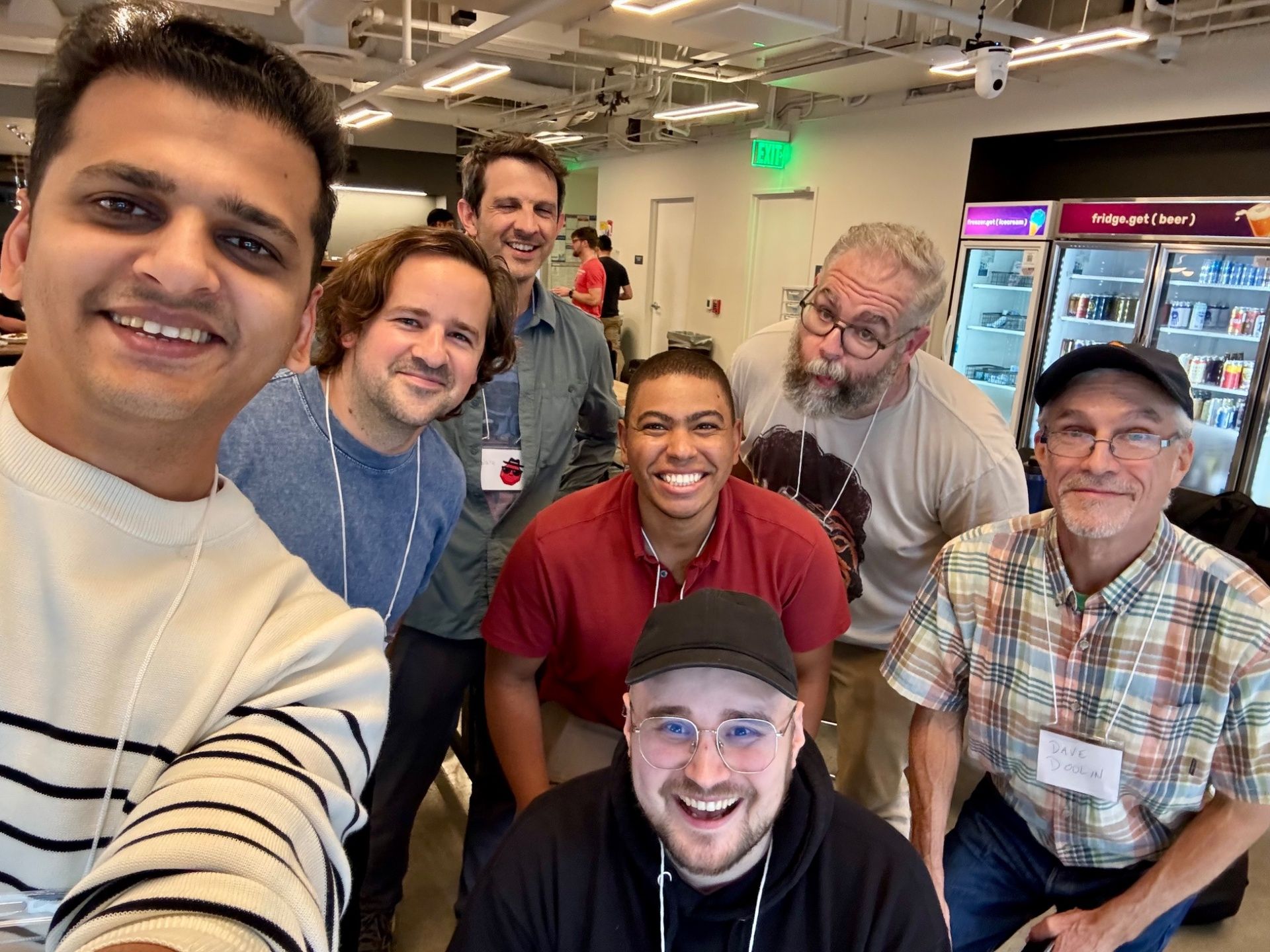
Ruby AI Hackathon Organizers and Winners. Credit: Yatish Mehta
This past weekend saw the first ever Ruby AI Hackathon take place in San Francisco, California! The following is a contribution from Yatish Mehta, one of the organizers of the hackathon, for the Ruby AI Newsletter.
Picture this: 55+ developers gathered in a room on July 19th, 2025, some wielding multiple monitors like digital fortresses, others boldly coding on iPads. Welcome to the SF Ruby AI Hackathon, where the only thing more diverse than the hardware setup was the skill level - complete beginners sat shoulder-to-shoulder with seasoned experts, all united by one mission: building something amazing with Ruby and AI.
The energy was infectious. By day's end, the projects ranged from the brilliantly practical to the wonderfully unexpected. Josh Leichtung took home top honors with Vibeseq, a collaborative music production platform that turns AI into your creative bandmate. Jonte Craighead's LLM Workbench proved that building AI-powered pipelines doesn't have to be painful, while Andrew Ford and Nathan Tate's Wheel Town tackled urban cycling safety with an AI twist.
But the real magic happened in the margins. Honorable mentions included an AI couples therapist (relationship debugging, anyone?) and a project that let developers code in Hindi - because why should English have all the fun?
Organized by the dynamic trio of Yatish Mehta, Kamil Nicieja, and Dave Doolin, with backing from Fly.io, Sentry, Continue, and Evil Martians, the event proved something important: Ruby's AI moment isn't coming - it's already here. The question isn't whether Ruby and AI belong together, but what incredible things the community will build next.
A huge thank you to Yatish for contributing such an amazing recap of the event! Some great conversations came out of the event, be sure to check out the following interviews for more insights into the hackathon:
Participant: Aran
Judge: Justin Bowen
Sponsor: Irina Nazarova
Update: DSPy.rb, a library for structured LLM programming, is moving forward quickly. DSPy.rb version 0.10.1 was just released, with automatic type conversion, better error handling, and improved documentation. Additionally, Vicente Reig has been regularly blogging about the updates, with four new posts since the last newsletter. Stop Fighting JSON Parsing Errors in Your LLM Apps explores strategies for improving JSON parsing with safe deserialization, whitespace handling, error mitigation, and schema validation. Program of Thought: The Missing Link Between Reasoning and Code demonstrates how structured prompting and reflection loops can guide AI reasoning and improve reliability. Ship AI Features with Confidence: Type-Safe Prediction Objects shows how to create type-safe prediction objects, ensuring structured, reliable AI outputs using classes and validation. And Union Types Agentic Workflows documents how to leverage union types to build more robust, agentic AI workflows that can handle varied input-output formats.
Update: Carmine Paolino announced some updates for RubyLLM, most notably integrating a Chat#with_params method to allow for adding custom parameters to the LLM API payload, unlocking features not yet supported in the library (example usage here). Carmine also created a Scale with Async guide and an Ecosystem page. The ecosystem page currently features RubyLLM::Schema by Daniel Friis, and RubyLLM::MCP by Patrick Vice. Patrick recently highlighted the features and capabilities of RubyLLM::MCP in the Reddit post RubyLLM::MCP – A Pure Ruby Client for the Model Context Protocol. If you’ve built a library or tool that extends RubyLLM, you can be added to the ecoystem page by:
Opening a PR to add your project to this page
Sharing it in the RubyLLM GitHub Discussions
Using the
ruby_llmtopic on your GitHub repository
Announcement: Samad Ahmed made a cookbook of Anthropic-inspired examples of building AI agent workflows for RubyLLM. The examples include an evaluations optimizer, an orchestrator worker, parallelization, prompt chaining and routing. [X/Twitter post]
Cheatsheet: Rhiannon Payne revealed a new cheatsheet for ActiveAgent at the RailsConf hack spaces. It is a great explainer for getting started with ActiveAgent, what you can build, and the benefits of the library over alternative solutions.
Article: Jonathan Greenberg of Ruby consultancy firm Flagrant experiments with an AI-powered Rails and Hotwire prototype in Sweet Streams. The app uses Rails, pgvector, and OpenAI to power a RAG-style chat interface (with TurboStreams and ActionCable) for uploading documents and parsing PDFs into embeddings. [h/t Landon Gray]
Tutorial: Kody Kendall published two videos on Learning How to Build an AI Powered Ruby on Rails Web App from Scratch. The recordings look at setting up a Rails app, creating the MVC architecture, integrating LlamaBot for AI workflows, and using CodeAct for AI task execution. Part 2 is available here. Kody also detailed White Labelling LlamaPress AI - How to Build Your Own Custom AI App with LlamaPress, looking at creating a custom AI application with his open source software platform LlamaPress.
Article: Hans Schnedlitz walks through using Claude Code alongside Rails and Git worktrees in Rails, Claude Code and Worktrees. Hans explains how isolating branches with worktrees enables parallel AI agent workflows in Rails projects, letting developers run multiple Claude-powered agents concurrently without conflicts.
Announcement: Marcus Schappi released an Unofficial Claude Code SDK for Ruby. The gem is a Ruby wrapper for Anthropic’s Claude Code with support for basic and streaming prompts, multi-turn conversation flows, tool execution, and integration with MCP servers. The source code is available on Github.
Article: Scott Werner added two posts to his “Works on My Machine” series. The first warns against settling for “adequate” AI-generated software in The Great Flood of Adequate Software. Scott argues that AI makes shipping easy but often leads to average quality, shifting more burden onto developers to ensure quality through oversight and refinement. The second questions the rush to adopt AI-first development in Nobody Knows How to Build with AI Yet. The post posits that while AI can generate entire codebases quickly, developers still must guide these outputs, making the ability to provide clear specifications a key new skill in the age of AI.
Video: Anton Panteleev released a talk from Ruby Australia on Speed-run on AI and MCP with Ruby, exploring prompt engineering, retrieval-augmented generation, and the Model Context Protocol by building a discount code MCP server with FastMCP.
Update: Samuel Williams pushed an update to agent-context, adding support for agent.md files, and details the support in Ruby and Claude's Great Adventure: How We Made Gems AI-Friendly. Agent::Context is a framework for Ruby Gems to expose LLM context. Samuel used agent-context to finish 100% documentation and test coverage for async-job with help from Claude.
Newsletter: Landon Gray sent out a new edition of his newsletter Curious Centroid. Its packed with updates and insights, including highlights on AI search training, a talk on retrieval augmented generation, the announcement of Dashi.rb, key blog posts, and examples of some of his AI prototypes. I encourage you to check it out and subscribe now.
Tutorial: Miles Georgi detailed Writing an AI Agent in 1 Line of Ruby Code Using Foobara's AgentBackedCommand. The post highlights how this abstraction wraps LLM logic into simple Ruby commands, enabling rapid prototyping of AI-driven features. He also posted a companion video to YouTube.
Course: Pete Hawkins recorded a preview for his course AI on Rails on Extracting Text from File Uploads using Langchain, OpenAI, and Neighbor for vector search. Pete also launched the Decanted Execution Podcast, covering building online businesses and AI's real impact on everyday business.
Article: Andres Alejandro Coronel Rodrigues shows to Turn Your Rails App into an AI‑Ready MCP Server with FastMCP. Andres explains how to set up background agents, define prompt schemas, and connect the LLM to build agent workflows for prompt-driven Rails integrations.
Code: AWS updated their Amazon Comprehend documentation with an example Ruby app, showcasing end-to-end AI integration in Ruby with AWS. The application processes multilingual customer feedback cards for a fictional hotel using Amazon Textract to extract text from uploaded images, Comprehend to detect sentiment and language, and Polly to generate audio.
Update: Dewayne VanHoozer introduced version 0.9.10 of AIA, a personal AI assistant framework built around prompt-driven development, adding support for MCP servers. The latest docs go into AIA’s core philosophy, batch mode, prompt sequencing, interactive chat sessions, and advanced tool integration.
Article: Abdelkader Boudih argues 2025 belongs to the “Apex Architect”, a term he uses to describe focused, small development teams who ship faster and with more clarity than committees in Apex Architect. Abdelkader says the era of design-by-committee is ending is ending, and cites tools like Rails, SQLite, and Claude Code to show how AI-assisted workflows enable rapid iteration.
Code: Dieter S. built an example of an AI workflow with Ruby for backing up your own Medium posts in multiple structured formats using OpenAI.
Podcast: David Heinemeier Hansson was on the Lex Fridman Podcast for DHH: Future of Programming, AI, Ruby on Rails, Productivity & Parenting, discussing a wide variety of topics including the future of programming, the future of AI, and vibe coding. David was also featured in Business Insider, and shared additional thoughts on the podcast episode with The 6 Hours of Lex. Additionally, he recommended an AI article by Salvatore Sanfilippo on Coding with LLMs in the summer of 2025 (an update).
Announcement: Alex Shagov published a Ruby gem for LLM-powered automated web search called deepsearch-rb. The gem leverages ruby_llm, async, and nokogiri to orchestrate search queries, scrape results, generate embeddings, and build summarization pipelines.
Video: Dominic Lizarraga revealed his intended lightning talk for RailsConf, AI Writes the Code You Set the Boundaries | Write Tests with LLMs. The video shares three techniques to tweak your LLMs when you ask them to write tests.
Announcement: R.J. Robinson introduced FlowNodes 0.1.0, a minimalist, graph-based Ruby framework inspired by PocketFlow for building LLM-powered workflows in Rails projects. FlowNodes supports async execution, thread-safe parallel processing, retry logic, and chaining of nodes for complex agents or RAG pipelines. Be sure to check out the complete tutorial.
Course: Le Wagon created Build the future: AI Software Development Bootcamp, a course designed to learn AI application development with AI integration. The course covers full-stack engineering with Rails, OpenAI, and Copilot.
Article: Justin Searls has been speaking frequently on AI issues lately. In TLDR Is the Best Test Runner for Claude Code he introduces TLDR, a fast test-runner optimized for Ruby, and explains how TLDR streamlines faster development cycles with clearer AI-assisted test diagnostics. He also shares how to Notify Your iPhone When Claude Code Finishes, explores Full-Breadth Developers in the realm of Generative AI, and discusses AI extensibility in the Breaking Change podcasts Go Home Claude, You’re Drunk and Use AI in Anger.
Podcast: Daniel Doubrovkine was on the HangerDX Podcast to discuss Augmenting Engineers With AI at Shopify. Daniel discusses strategies for using AI to assist engineers within Shopify’s massive Rails monolith, the value of staying hands-on with code, and how AI is reshaping team workflows.
Video: Thoughtbot released two videos, the first, Senior Developers Versus AI Coding has a real developer and Copilot building the same feature and comparing the results. The second, Pair Programming with AI, implement a new feature using Rails' ActionMailbox and discusses workflows using ChatGPT, Claude, and Copilot to explore how these tools can complement human problem-solving. They also published AI in Focus: Refactoring Rails with AI Tools, demonstrating how GitHub Copilot, Claude 3.5 Sonnet, and GPT‑4o can assist in detecting anti-patterns and refactoring a large Rails model.
Tutorial: Richard Baldwin of Cloving.ai, an AI command line pair-programmer service, wrote GPT-Driven Debugging Solutions for Ruby on Rails Applications. The tutorial uses the Cloving CLI to debug, test, and review code for a Rails application.
Tips: Rob Zolkos wrote Context7: The Missing Link for AI-Powered Coding. Rob introduces Context7, a tool that enhances documentation to improve AI coding workflows, and explains how adding structured code comments, function summaries, and usage examples can guide LLMs to generate more accurate and maintainable code.
Course: CodeSignal launched a course on Adding Enterprise Features to Your Ruby on Rails App. The course uses Cosmo, CodeSignal’s proprietary AI guide and tutor to prompt you with challenges and help unblock you when you get stuck.
Video: Ken Greeff shared some of the AI tools he is using to increase his productivity in Stop Wasting Your Time Coding with AI.
Announcement: Jay Pandya presented an unofficial MCP tool for updating Postman documentation. While written in Python, Rails API MCP Server automatically regenerates OpenAPI JSON for API endpoints, updates Postman collections, and syncs changes directly from Rails code.
Book: It was revealed at Ruby Conf Africa 2025 that Obie Fernandez is revising his book and will be launching Patterns of Application Development Using AI Revisited. [h/t Bernard Banta]
Video: Luis Payan of BEON Tech demonstrates how to integrate AI tools into Rails apps in Ruby on Rails in the Age of AI Adapt, Integrate, Evolve. Luis walks through real-world examples like semantic search with pgvector and LLaMA3, an AI-powered product chat assistant, and LLM-generated SQL reports.
Tips: Ilya Tkachov shared code review prompts to take Rails to the next level in this X/Twitter thread.
Update: Stan Lo announced that ruby-lsp, an implementation of the language server protocol for Ruby, has a CLAUDE.md file included now for use by contributors using Claude Code to make updates to the library.
Podcast: Matt Swanson visited the IndieRails podcast to discuss what it means to be a product engineer, the easiest way for devs to get to $10K MRR, and working with generative AI tools in Matt Swanson - The Product Engineer.
Tips: Kristoph highlighted an example of using the Intelligence gem to implement support for Azure’s AI Foundry chat completions in this X/Twitter thread, and shared that it will be part of Inteligence’s 1.1 update.
Feedback: DefMethod is building out a suite of tools for agent orchestration and full test coverage, issue handling, and design recommendations for Ruby on Rails applications and is looking for feedback and Rails applications that need a refresh.
Are you using Ruby-based agent frameworks? Got thoughts on replacing CrewAI with something homegrown? We’d love to hear what’s worked (or not!) for you.
Discussion: There was a thread on Reddit’s r/rails subreddit on What's your GenAI stack look like today? with some suggestions on Ruby AI tech stacks.
Tips: Jose Farias posted to X/Twitter about the lack of support for building prompts as views in Ruby, and the resulting thread has solid suggestions on tools and techniques for prompt management.
Feedback: Brad Gessler is considering building a course on AI applications with Rails and is looking for feedback. What topics and gems would you like to see included?
I'm getting ahead of myself, but a thought that's been living right free in my head, particularly today, is a course on building AI apps in Rails. I think the ecosystem needs to bake a bit more, but @TonsOfFun111 & @paolino's gems would probably make an appearance. Any others?
Tips: According to reports from the Ruby AI Hackathon and some users on X/Twitter, bolt.new is surprisingly good at vibe coding with Ruby on Rails. What are you thoughts? Have you built any Rails apps with Bolt?
wtf you can vibe code Ruby on Rails with @boltdotnew?!
Events
Previous
RailsConf: Two weeks ago I attended RailsConf, and it was a truly incredible experience with the opportunity to learn from and meet so many amazing people. And the conference turned out to be a lot more focused on artificial intelligence than I expected. Below are some of the AI highlights from the conference.
Justin Wienckowski and Jake Gribschaw presented Getting More Out of LLMs for Ruby Developers and shared lessons from Chime's programs piloting tools for developer use and practices learned building an AI code review bot.
Justin Bowen and Rhiannon Payne hosted a packed hackspace for ActiveAgent and released a new cheatsheet (posted above in the Content section), and Justin gave a lightning talk on building with ActiveAgent.
Tia Anderson showcased the new Pom app, a calming space to track your garden, your growth, and your gratitude. Tia used OpenAI to generate calming journal entries related to self-reflection and nature, and plans to build out more AI-enabled features in the future. The slides from the lightning talk are available here.
Vladimir Dementyev and Albert Pazderin demonstrated why The Future of Rails Begins in the Browser. The presentation featured a browser-only version of the Getting Started Guide for Rails using WASM, WebContainers, and OpenAI integration, and offers an exciting new future of limitless possibilities for web-based applications with Ruby and AI.
Irina Nazarova gave a talk on Startups on Rails in Past, Present and Future, leaning heavily into imminent renaissance of Ruby in the new artificial intelligence landscape. The presentation looks at the companies already relying on AI to rev-up developer productivity and new features, the Ruby AI ecosystem, and the missing links necessary to enable next generation tooling (along with a shoutout to the Ruby AI Newsletter!).
ArtificialRuby: Sultan Hassan gave a recap of the ArtificialRuby July Meetup, covering the presentations by Patrick K. on shipping fast with Rails and AI, Sameen Karim on documenting messy analytics with static analysis & LLMs, and Amanda Bizzinotto on building multi-agent systems.
Ruby Warsaw Meetup: Visuality posted two videos from the PLRUG Meetup. The first was Can You Fix a Car with AI by Mateusz Woźniczka. The second was an Introduction to Model Context Protocol (MCP) in Ruby on Rails by Paweł Strzałkowski.
Berlin Ruby + AI Meetup: Ruby Europe posted five videos from the Berlin Ruby + AI Meetup on June 24th:
Mariusz Kozieł: Introduction for the Ruby + AI Meetup
Paweł Strzałkowski: Joy of Creativity in the Age of AI
Chris Hasiński: AI, Offline
Yorick Jacquin: FastMCP - How to Connect AI Models to your Ruby Applications
Sergey Sergyenko: TDD 2.0: AI Brings Test-Driven Development Back on Track
Upcoming
August 6th - Meetup: ChicagoRuby will feature a talk by Miles Georgi on Wrangling Domain Complexity with Foobara at Workforce.com in Chicago on August 6th.
August 9th - Conference: RubyConf Taiwan on August 9th and 10th in Taipei City, Taiwan will include 5 speakers on Ruby Hardware and AI topics:
Hitoshi Hasumi: Well, PicoRuby Can Do That
Kazuaki Tanaka: From Scripts to Circuits: IoT Applications with mruby/c
Hayao Kimuru: RISC-V CPU emulator made with Ruby
Etrex Kuo: Ruby - MCP Server
Aotoki Tsuruya: Crafting AI-Friendly Application in Ruby
August 13th - Meetup: ArtificialRuby is hosting a meetup at Betaworks in New York City on August 13th. If you are interested in presenting at an ArtificialRuby meetup, please fill out this form and let them know!
September 4th - Conference: Rails World 2025 on September 4th and 5th in Amsterdam, Netherlands will have three Ruby AI presentations:
Andrew Mcnamara: AI Agents at Scale
Kinsey Durham Grace: Beyond the Prompt: Building Real-World LLM Features in Rails
Paweł Strzałkowski: Make Rails AI-Ready by Design with the Model Context Protocol
September 18th - Conference: The EuRuKo (European Ruby Conference) on September 18th and 19th in Viana do Castelo, Portugal has announced seven Ruby AI & Hardware related speakers:
Obie Fernandez: Roasting Code for Fun & Profit with Structured AI Workflows
Paweł Strzałkowski: Making Rails AI-Native with the Model Context Protocol
Carmine Paolino: RubyLLM: Making AI Development Beautiful Again
Lucian Ghinda: Don't Let Your AI Guess: Teach It to Test!
Ivan Nemytchenko: Slingshot Development: Vibe Coding with Ruby Done Right
Albert Pazderin: Building interactive Ruby gem tutorials with Wasm
Hitoshi Hasumi: PicoRuby Hands-on: Internet of Things Edition
Open Source Updates
New Gems
aws-sdk-bedrockagentcore - Amazon Bedrock AgentCore Data Plane Fronting Layer
aws-sdk-bedrockagentcorecontrol - Amazon Bedrock Agent Core Control Plane Fronting Layer
aws-sdk-s3vectors - Amazon S3 Vectors
claude_code - SDK for Claude Code with streaming support and ergonomic MCP integration
claude_code_sdk - SDK for Claude Code
claude-code-sdk-ruby - SDK wrapper for Claude Code
deepsearch-rb - Perform LLM-powered automated web search
evals - A library for LLM evals
flow_nodes - Port of PocketFlow, the minimalist LLM framework
langfuse-ruby - SDK for Langfuse - open source LLM engineering platform
langgraph-platform - SDK for LangGraph Platform API
llms-txt-ruby - Implementation of the llms.txt specification for LLM-friendly content
mcp_ui_server - Server SDK for MCP UI
oslovision - Client for the OsloVision API
rails-nl2sql - Rails gem for converting natural language to SQL
raix-openai-eight - Ruby AI eXtensions
schwab_mcp - MCP server for Schwab API integration
semantic_pen - Official Ruby SDK for SemanticPen API - AI-powered content generation
yardmcp - Programmable server for Ruby gem/YARD documentation via FastMCP
New Apps
Sales-Agent - Intelligent sales automation platform that combines Ruby on Rails with Large Language Models
decidim-ai_third_party - Extends Decidim AI module with AI systems
replytrap - AI-powered scambaiting suite that monitors email accounts, detects scams, and uses customizable personas to engage scammers in conversations that waste their time
ais - Deterministic AI server for orchestrating multi-agent workflows
ai_financial_advisor - AI agent for Financial Advisors that integrates with Gmail, Google Calendar and Hubspot
cerridwen - Front end custom AI coding rules generator
cocina-ai-agent-orchestration - Orchestrate the lifecycle of multiple AI agents running in Docker containers
backup-my-post - AI-powered workflow for backing up your own Medium posts in multiple structured formats
weaviate_mcp_server - MCP server that bridges AI assistants with Weaviate vector databases
frog-adventure-game - Text-based adventure game where you explore with AI-generated frog companions
blueprints-cli - CLI for managing, searching, and organizing reusable code snippets with AI-powered semantic search and analysis capabilities
pester - AI-powered task enforcer
llm-workbench - Build flexible LLM-enabled pipelines
ai_hub - Connect to aan AI chat assistent
consolle - A IRB/Rails console server leveraging LLM tools like Claude Code for enhanced debugging capabilities
Jobs & Opportunities
In addition to the 20 new careers below, last week I published a mega Ruby AI Jobs & Opportunities Report with over 250 roles at the intersection of Ruby and Artificial Intelligence available right now. Check it out here:
Multiple
Remote - Stitch Fix delivers personalized clothing selections based on individual preferences: 9 OPEN POSITIONS, including:
Machine Learning Engineer - Foundational Models
Machine Learning Engineer - Recommendation Algorithms and Foundational Models
Principal Data Platform Engineer
Director of Engineering, Shared Services
Senior Lead Engineer, Fulfillment Platforms
Remote
CompanyCam helps contractors document, organize, and share job site photos: Senior Engineering Manager
DocMe360 is a digital strategy firm serving government and healthcare sectors: Ruby on Rails/React Full Stack Engineer
Eltropy is an AI platform for digital conversations in banking: Backend Engineer (Ruby on Rails)
Evil Martians builds high-performance tools, scaling startups, and open-source products: Frontend Engineer
Evil Martians builds high-performance tools, scaling startups, and open-source products: Developer Marketing Manager
G2i recruiter: Software Engineer, AI (Ruby)
G2i recruiter: FullStack (Ruby + React) Developer
Redflag AI protects digital assets with AI-powered piracy detection and takedowns: Senior Software Engineer (Platform, Ruby on Rails)
Zipchat AI automates e-commerce customer interactions to increase sales and engagement: Ruby on Rails Dev - AI Agent
Onsite
San Francisco - Monograph is a project management tool for architecture and engineering firms: AI Prompt Engineer
Tokyo - Autify is an AI-powered test automation platform enabling no-code, scalable testing: Senior Machine Learning Engineer, LLMs & Prompt Engineering (New project)
Are you an organization searching for an expert Ruby AI developer, or a Rubyist looking for your next development role with AI? Please reach out and let me know the type of opportunity you’re pursuing: [email protected]
One Last Thing
Brian Casel of Builder Methods launched and open-sourced Agent OS, a framework designed to enhance AI coding agents like Claude Code and Cursor by providing workflows and context. Agent OS uses structured workflows that capture your standards, your stack, and the unique details of your codebase necessary to give your agents the specs they need to ship quality code. Check out the demo video.
That’s all for this edition! Be sure to reach out if you have any stories, content, jobs, or events you want featured in the newsletter.
